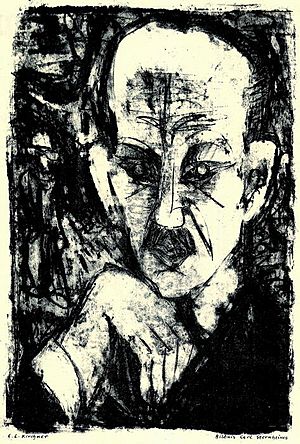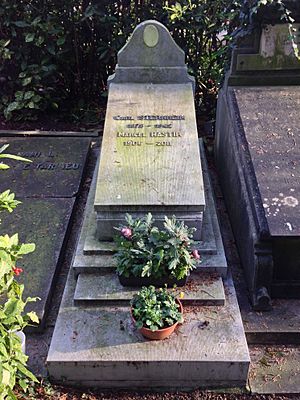Carl Sternheim facts for kids
Quick facts for kids
Carl Sternheim
|
|
|---|---|

Ernst Ludwig Kirchner portrait of Carl Sternheim 1916
|
|
| Born | William Adolph Carl Francke 1 April 1878 Leipzig, Germany |
| Died | 3 November 1942 (aged 64) Ixelles, Belgium |
| Resting place | Ixelles Cemetery |
| Occupation | Playwright and writer |
| Period | Wilhelmine |
| Genre | Short stories |
| Subject | Moral sensibilities of the emerging German middle class |
| Literary movement | Expressionism |
| Spouse | Eugenie Hauth |
Carl Sternheim (born William Adolph Carl Francke; 1 April 1878 – 3 November 1942) was a German writer. He wrote many plays and short stories. He was a key figure in a German art movement called Expressionism. Sternheim often used humor and satire to comment on the ways of the new middle class in Germany. This was during the time of Emperor William II.
Contents
Carl Sternheim's Early Life
Carl Sternheim was born in Leipzig, Germany, on April 1, 1878. His father, Carl Julius Sternheim, was a banker. His mother was Rosa Marie Flora. Carl grew up in Hannover and Berlin.
Between 1897 and 1902, he studied different subjects. These included philosophy, psychology, and law. He attended universities in Munich, Göttingen, and Leipzig. However, he never finished his degree.
Family and Writing Career
In 1900, Sternheim started working as a writer in Weimar. That same year, he married his first wife, Eugenie Hauth. They later divorced in 1906.
In 1907, he married another writer named Thea Löwenstein. They had two children together. Their daughter, Dorothea, faced many challenges during World War II.

Thea came from a wealthy family. This allowed them to build a large house called Schloss Bellemaison in Munich. Here, Sternheim worked with other artists. These included Max Reinhardt and Frank Wedekind.
In 1908, Sternheim helped start a literary magazine called Hyperion. This magazine was important for the Expressionist movement. It even published some of the first works by Franz Kafka. Sternheim also wrote for another Expressionist magazine, Die Aktion.
In 1912, Sternheim and his family moved to Belgium. During World War I, they had to move again. They went to Switzerland for a while. Sternheim and Thea divorced in 1927. He later married actress Pamela Wedekind. This marriage lasted from 1930 to 1934.
Carl Sternheim died in Ixelles, Brussels, in 1942, during World War II. He was buried in the Ixelles Cemetery. His friend, Marcel Hastir, was later buried in the same grave.
Sternheim had many famous friends. These included writers and thinkers like Gottfried Benn and Walther Rathenau. In 1915, he gave prize money to Franz Kafka, who was not well-known at the time.
The Nazi government banned Sternheim's books. This was partly because of his Jewish background. It was also because his plays often made fun of the German middle class.
Carl Sternheim's Art Collection
Carl Sternheim was also an art collector. He was one of the first people to admire the painter Vincent van Gogh. In 1912, he loaned several of his Van Gogh paintings to a big art show in Cologne. This show was called the 1912 Sonderbund.
The Van Gogh paintings he loaned included "Still life with coffee pot, dishes and fruit" and "L'Arlésienne."
Plays and Adaptations
Carl Sternheim's plays are still popular in Germany. However, they are not often performed in English-speaking countries. It can be hard to put his plays on stage in other languages. This is because his unique style doesn't fit neatly into one type of theater.
One famous English production was The Plumber's Progress. This was a version of Sternheim's play Bürger Schippel. It starred Simon Callow and Harry Secombe in the 1970s.
In 2011, two of Sternheim's comedies were performed in London. These were Paul Schippel Esq. and The Fossil. More recently, in 2018, a new version of three of his short plays opened in Washington, D.C.
Images for kids
-
Ernst Ludwig Kirchner portrait of Carl Sternheim 1916
See also
 In Spanish: Carl Sternheim para niños
In Spanish: Carl Sternheim para niños


